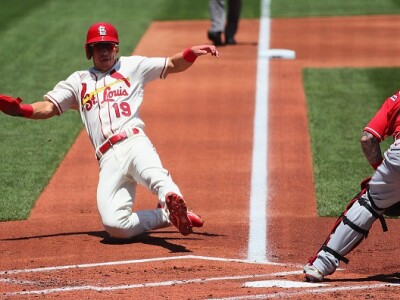As we enter the middle of the fantasy baseball season, it's prime time for trades. Managers are getting a better grasp of what the strengths and weaknesses are and in keeper leagues some teams realize the team isn't going to cash and they are ready to look towards next season.
One of the biggest questions I get asked about a trade is: “Who wins this trade?” This is the wrong question. It's not about winning a trade. Trust me, I am as competitive as anyone and I want to win at everything. I won't let a first date win if we are playing pool, mini golf or bowling. I'm not built that way.
The goal of a trade is to improve your team. It's also helpful to make sure it helps the trade partner, too. An example of a trade that most people will say is in favor of one side is Matt Olson for Tommy Edman. I think if we posted a poll on this deal most people would say the Olson side won.
Edman is batting .267 with 33 runs, four home runs, 18 RBIs and 12 stolen bases. Olson is batting .274 with 38 runs, 15 home runs, 40 RBIs and no stolen bases. If the manager with Olson is first in home runs, first in RBIs and getting a player like a Corey Seager or Mike Moustakas off the injured list soon, they are in good shape in home runs and RBIs.
The team with Olson is low in stolen bases and in most leagues, the category is tight. The team with Olson is last in steals with 24, but can pick up five points with 10 more steals. As you can see, it makes sense for the deal to help move up the standings.
There are many times people blindly look at a trade and analyze its lopsided on one side. Before making that assumption, context is needed. For roto formats, it's all about gaining the most points in categories. If you have a lead of 20-25 home runs, it likely means there's a surplus of power that can be moved to gain in a tight category. Analyze the roster realistically. Even if the lead is big in home runs, you might believe it won't last with several overachieving players.
Another aspect of trading people get wrong is looking at the other person's roster before offering a trade. In one of my leagues this season, I have been first in saves with a considerable lead over the teams third and fourth in saves. I had Mark Melancon, Hector Neris, Jake McGee (before the emergence of Tyler Rogers) and Taylor Rogers. If I were making an offer to a team with this group, I wouldn't offer a closer. It makes no sense. How does a closer help this team?
Yet, I was getting offers for a closer and me giving up a power hitter when it was my weakest category. This is insulting and it makes me not want to deal with this person since they clearly could care less about helping me. They didn't even look at what I need.
If I need saves, the first thing I do is look to see which teams are at the top in saves. Then I look to see which closer I like and if they can afford to deal one. Then I look to see where they need help and if I have the players needed. Sometimes, there's no fit. If that's the case, I move on to another team. Just like in life, not everyone is compatible. There are times people come to me and there's not a fit to make a trade.
Stolen bases is another category which is usually tight. There might be a team with Whit Merrifield, Trea Turner, Garrett Hampson and Cedric Mullins. They likely have a nice lead in stolen bases and four more stolen bases can pick up three to six points in the standings. There's a potential trade partner.
It's also wise to look at teams at the bottom of the standings to make trades with. Often, they are frustrated and want to do something just to change things up. They're more vulnerable and might give up something more than you expect.
A lot of times people wonder why trades don't get done. One of the reasons is it takes work. Look at the standings, look at the roster grid and determine where there's a fit for both sides. Don't blindly send trades. Take the steps necessary to have it make sense for both sides. Remember, it's not about winning a trade. It's possible to lose a trade in the eyes of the masses, but it actually improves your team. The goal is to improve the team and win.
Player News
{{item.text}}
{{analysis.analysis}}


